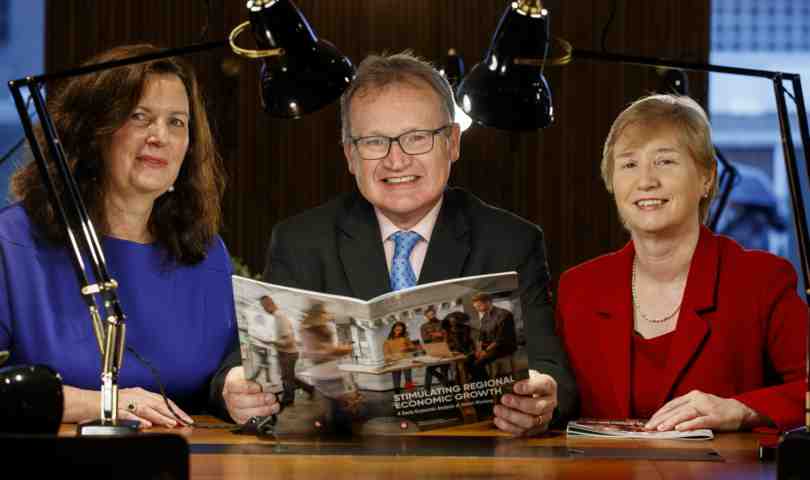New research commissioned by Vodafone suggests that setting up digital hubs in every county in Ireland could create more than 8,400 new jobs.
The study, carried out by economist Jim Power, was undertaken to assess how smart working – flexible or remote working from home or a hub – can help rural communities “thrive in a meaningful way”.
A quantitative analysis of job creation, talent migration, economic activity and outputs of the businesses that operate in six of Vodafone and SIRO’s digital hubs provided the data to fuel the report.
The hubs assessed include Ludgate, Skibbereen; HQ Tralee; Creative Spark, Dundalk; The Mill, Drogheda; New Work Junction, Kilkenny; and Enterprise House, Carlow.
• Download Vodafone Smart Working Report
In terms of financial contribution, the combined economic data collected from each of the six hubs involved in the report reveals that they employ 462 people, host 176 businesses, contribute €27m to the economy and €18m in net wages earned.
All of the digital hubs are operating at or close to full capacity, and all want to expand their physical space further to satisfy significant growing demand.
Based on their performance, the Vodafone-commissioned report predicts substantial economic gain from establishing digital hubs in every county. Among its key financial predictions, the report contends that ramping up digital hub numbers could result in:
- €52m being generated for the Exchequer, with €1.56m in commercial rates
- 1,040 unique new businesses
- 5,200 direct new jobs
- 3,640 indirect employment in surrounding local communities where a digital hub is based
- €312m in economic contribution through the income multiplier effect.
Alongside alleviating urban migration and slower regional economic growth, the study also makes the case that the widespread adoption of smart working would result in a significant reduction in congestion and commute times, ease pressure on housing in cities, provide greater availability of school places and generate more employment of young graduates locally.
The research also paints a picture of how smart working can help rural communities thrive in a meaningful way and provide people with a better quality of life.
Commenting on the report, Jim Power said that remote working can address contemporary problems such as congestion, quality of life and imbalanced regional economic growth. “With proper connectivity, there is no reason why remote working cannot grow in significance,” he added.
Regina Moran, director of enterprise at Vodafone Ireland, said that the study’s findings offer a viable basis for wider adoption of smart working in Ireland.
“It also provides proof of concept that smart working and digital hubs can act as a stimulus to addressing the urban and rural socio-economic challenges that exist in Ireland. Gigabit connectivity is fundamental to achieving that,” Moran continued.
RDI Hub
Separately, a new research, development and innovation hub in Killorglin in Co. Kerry is taking applications to recruit companies and individuals for its opening in January 2020.
RDI Hub is backed by Fexco, IT Tralee and Kerry County Council. It anticipates attracting at least ten companies as members in its first year, with space to accommodate 80 people in the building. The RDI Hub will be located in a 20,000 sq. ft. premises in Killorglin, donated by Fexco.
Entry will be through a competitive process and applications will be taken until October 25 for companies interested in the space from January 2020.
Liam Cronin, chief executive of RDI Hub, commented: “The south-west region is already synonymous with entrepreneurship and technology, particularly focused on the fintech sector, and we are confident that the calibre of applications we receive will be extremely high.”
In addition to mentoring and training opportunities, members of RDI Hub will benefit from training programmes, 1GB broadband connectivity, conference rooms and workshops
RDI Hub’s home is the previously-named Liebig Building, a former factory outside Killorglin that is currently undergoing redevelopment. The building will be renamed in honour of John McCarthy as a tribute to the Stanford University computer scientist, one of the founders of the discipline of artificial intelligence, whose father was born in Cromane in Kerry.
Photo: Regina Moran (right) with Jim Power and Adrienne Harrington, CEO of Ludgate, Skibbereen. (Pix: Andres Poveda)








